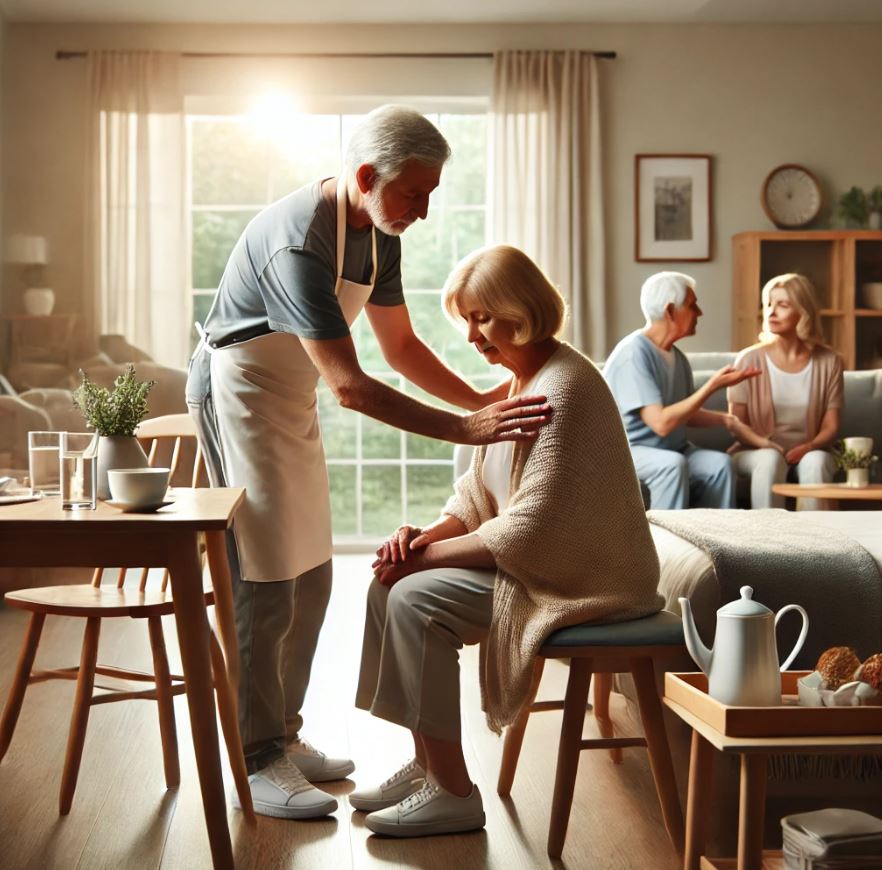In assisted living homes, the establishment of daily routines is essential to providing structure, stability, and a sense of purpose for residents. As individuals age, consistency in their environment and schedule becomes increasingly important for their physical, mental, and emotional well-being. Daily routines are more than just practical—they help seniors maintain a sense of normalcy, independence, and dignity, which can greatly enhance their quality of life.
This article will explore why daily routines matter in assisted living settings, how they benefit residents, and how caregivers can create routines that balance individual needs with group activities.
1. The Psychological Benefits of Daily Routines
For seniors, especially those facing cognitive decline, a well-structured daily routine can have a profound impact on mental health. Consistency in daily activities creates a sense of security and familiarity, which is essential in fostering emotional well-being.
a. Reducing Anxiety and Stress
Routines help reduce feelings of anxiety and stress by making each day more predictable. Knowing what comes next in their schedule can alleviate fears or concerns about the unknown, which is particularly important for residents with memory issues or dementia. A routine allows residents to anticipate their activities, whether it’s breakfast, an exercise class, or an afternoon social event, offering a comforting rhythm to the day.
b. Enhancing Cognitive Function
For residents with dementia or cognitive impairments, routines play a critical role in maintaining cognitive function. Repetition of daily activities reinforces memory, helping seniors remember their next task or event. Simple routines, such as waking up, dressing, and having breakfast at the same time each day, can provide the cognitive stimulation that helps maintain memory recall and improves their overall sense of orientation.
c. Encouraging a Sense of Purpose
Having a daily routine gives residents a sense of purpose and direction. Whether it’s participating in a regular activity like gardening, attending a group exercise class, or engaging in a hobby, routines help fill the day with meaningful tasks. This fosters a feeling of accomplishment and satisfaction, which is vital for maintaining mental and emotional health.
2. Supporting Physical Health and Mobility
Daily routines are essential for promoting physical health, particularly for seniors who may have mobility challenges or chronic health conditions. A structured routine encourages physical activity, regular meals, and proper sleep, all of which contribute to overall well-being.
a. Encouraging Regular Physical Activity
Incorporating physical activity into daily routines is vital for seniors, as it helps maintain mobility, strength, and balance. Assisted living homes often include scheduled exercise classes, walking groups, or stretching routines that residents can rely on each day. These regular activities prevent physical decline, reduce the risk of falls, and promote cardiovascular health.
b. Supporting a Balanced Diet
Mealtime is another important component of daily routines in assisted living. Scheduled meals ensure that residents receive balanced, nutritious food at regular intervals. These routine meal times help seniors avoid skipping meals or overeating, which can contribute to better management of weight, diabetes, and other health concerns. Mealtime routines also offer opportunities for socialization, making dining a social event rather than an isolated experience.
c. Maintaining Healthy Sleep Patterns
Routines that establish consistent waking and sleeping times help regulate residents’ internal body clocks, leading to improved sleep quality. Poor sleep can exacerbate cognitive decline, depression, and physical health issues, so a daily routine that promotes regular sleep hygiene is essential. Bedtime rituals, like evening relaxation activities or reading time, can signal to residents that it’s time to wind down, ensuring a restful night’s sleep.
3. Promoting Independence and Personal Agency
A well-planned daily routine not only provides structure but also allows residents to maintain as much independence as possible. While assistance is available when needed, daily routines enable residents to manage parts of their day independently, which boosts confidence and self-esteem.
a. Fostering Personal Control
Giving residents a say in their daily routine empowers them to make choices about how they spend their time. Assisted living homes can create flexible schedules that allow residents to select activities that match their preferences and energy levels. This sense of control over their daily lives helps maintain their dignity and personal agency, encouraging them to remain actively involved in their care and lifestyle.
b. Encouraging Self-Care
Daily routines that include grooming, dressing, and other self-care activities help residents maintain their personal hygiene and appearance. When these activities are part of a structured routine, they become a natural part of the day, ensuring that residents feel confident and well-cared-for. Encouraging residents to manage these tasks independently or with minimal assistance helps reinforce their sense of autonomy.
c. Balancing Group and Individual Activities
Routines can be structured to balance group activities with individual time, giving residents the flexibility to engage in communal events while still enjoying personal time for hobbies, reading, or relaxation. This balance supports both social engagement and individual independence, allowing residents to tailor their day according to their needs and preferences.
4. Facilitating Socialization and Building Community
In an assisted living setting, daily routines often include group activities that foster socialization and create a strong sense of community. These regular interactions with other residents and staff provide emotional support and help combat feelings of loneliness or isolation.
a. Group Activities for Social Engagement
Scheduled activities such as games, arts and crafts, fitness classes, and outings give residents the opportunity to socialize with peers. Group activities create a shared experience that builds camaraderie and fosters friendships. Knowing that a favorite group activity is part of the daily routine encourages residents to participate, helping them stay socially active and engaged in the community.
b. Celebrating Milestones Together
Daily routines can also include opportunities for communal celebrations, such as birthday parties, holiday events, or special dinners. These regular events not only provide moments of joy and connection but also help residents feel part of a larger community. Assisted living homes can build these milestones into the routine, giving residents something to look forward to throughout the year.
c. Support from Caregivers
A consistent routine allows caregivers to build stronger relationships with residents, as they regularly interact with them during their daily activities. This familiarity fosters trust and a sense of security, helping residents feel supported and cared for in their environment. Caregivers who are part of a resident’s daily routine can also notice changes in their health or behavior, allowing for early intervention when needed.
5. Adapting Routines to Changing Needs
While consistency is important, daily routines in assisted living homes must also be flexible enough to adapt to the changing needs of residents. As health conditions evolve or mobility becomes more limited, routines may need to be adjusted to ensure that residents remain comfortable and safe.
a. Personalized Care Plans
Each resident in an assisted living home has unique needs and abilities, and daily routines should be tailored to reflect that individuality. Care plans can be personalized to include specific medical treatments, therapy sessions, or physical exercises that support the resident’s health goals. By adapting routines to meet these evolving needs, assisted living homes ensure that residents receive the right level of care while maintaining a sense of continuity in their lives.
b. Transitioning to New Routines
When residents experience significant life changes, such as a decline in mobility or the onset of memory-related conditions, it’s essential to help them transition to new routines that accommodate these changes. By gradually introducing new activities or adjusting schedules, assisted living homes can ease the transition and reduce feelings of disruption. Consistent support from caregivers during these transitions helps residents adjust to new routines with minimal stress.
6. Providing Comfort Through Familiarity
For many seniors, the comfort of familiar routines is deeply important, especially when adjusting to life in an assisted living home. Familiar routines offer a sense of stability and help ease the emotional transition of moving from independent living to an assisted care environment.
a. Easing the Transition
For new residents, the shift to assisted living can be emotionally challenging. Establishing a comforting routine soon after the move can help ease this transition. Regular mealtimes, scheduled activities, and consistent care from familiar staff create an environment where residents can settle in and begin to feel at home. Caregivers can also incorporate elements from a resident’s previous routine, such as morning walks or afternoon tea, to help them adjust more easily.
b. Familiar Routines for Memory Care Residents
For residents with memory loss or dementia, routines are particularly important. Repeating daily tasks at the same time each day helps these residents feel more grounded and reduces confusion or disorientation. Familiar routines provide a sense of security and consistency, which is essential in maintaining cognitive health and emotional comfort for memory care residents.
Shepherd Premier Senior Living believes daily routines are not just about creating a schedule—they are a cornerstone of residents’ well-being, providing stability, fostering independence, promoting social interaction, and enhancing both physical and emotional health.
The structure of a well-planned routine helps seniors maintain a sense of purpose, remain engaged with their community, and navigate the challenges of aging with confidence. By thoughtfully designing routines that cater to individual needs while offering opportunities for communal engagement, assisted living homes can greatly improve the quality of life for their residents.
Contact Shepherd Premier today to see if we’re a good fit for you.



